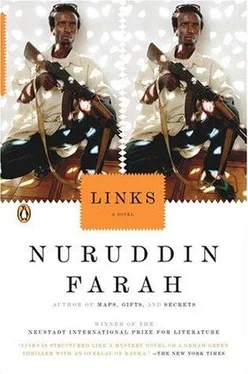“You feel left out when you are hurt?”
“I suppose that is what Shirin Fazel feels. Left out and victimized, because she is of Persian descent.”
“Is Faahiye hurt in a similar manner?” Jeebleh asked.
“Because his family was different from ours?”
“Did he speak about it?”
“That would be uncharacteristic of him.”
“Because he belongs to the old world, in which you don’t speak about what hurt you, is that why? Or is it because he believed that the clan business had nothing to do with his hurt? That it was personal?”
“He belongs to a world,” Shanta explained, “in which he expects that those hurting him will realize their mistake of their own accord and, without being told, stop hurting him any further.”
“What do people do when they’re hurt?” he asked.
“Tell me.”
“Some people go public, and they show the world that they’re hurt. They accuse those who’ve hurt them, they become abusive, vindictive. Some become suicidal. Some withdraw with their hurt into the privacy of their destroyed homes, and sulk, and whine. To someone who’s hurt, nothing is sacred.”
Jeebleh felt oddly comforted by the thought that Shanta, no longer tearful, was attentive. No outbursts of emotion, nor did she behave neurotically when they talked in general terms. He must take care not to spring a question on her, lest she drop into a state of nervous tension.
“Why, why, why, why?” she asked.
He disregarded her question; he should muster the strength and the wit to make her relax until Faahiye called or Bile arrived — Bile would, he thought, show up at Shanta’s sooner or later — whichever came first. Then he became aware of her fixed stare.
“He turned our private quarrel into a public spectacle,” she accused. “He left, so the world would talk about him. And do you know why he did that? He did that to exact vengeance.” She was calm, composed as she spoke, and nothing indicated that she would go weepy on him. “By going public,” she went on, “he brought his hurt out into the open, as though he expected to receive a proper redress. Did he think how I might feel, how Bile might feel? Then Raasta and Makka disappeared.”
Jeebleh realized that she was staring at him, in fact focusing on a dribble of saliva dangling from his lower lip. Embarrassed at his dribbling like a baby, as he was prone to do whenever he concentrated, he sucked it in with a gust of air. He remembered that he had lent her his handkerchief, so he dried his chin with the back of his hand. He was about to excuse himself, when she started to speak.
“A wife is not likely to display her hurt in public the way a husband does. A woman doesn’t go blatantly public until after she has tried other ways of communicating with her spouse. Women keep these things under wraps for much longer than men do. It’s only when a woman can no longer deal with it that she speaks of it, first to her friends, then to her spouse. Only when no solution to the problem is in sight does she speak to others. It takes a very long time before outsiders hear of the marriage problem from a wife. By the time a woman makes it public, we can assume that the marriage is doomed.”
He couldn’t help thinking that this sounded like the crossroads where the Somali people stood. Like Faahiye and Shanta, they were not prepared to talk directly, but only through intermediaries — in the case of Somalia, through foreign adjudicators. Interfamilial disputes had a way of becoming protracted, at times requiring an eternity for the parties in the conflict to sit face to face and talk — alone!
They both looked toward the door, then at each other. Jeebleh wasn’t sure if he had heard a car door open and then close. The optimist in him wondered whether that might be Faahiye coming home, with Raasta? He waited for the noise to make sense, but none came. He had almost given up, when the gate outside creaked. It was then that he stood, bracing himself for an unpleasant surprise. But when he opened the door, he saw Bile at the gate, waving to Dajaal as he drove off.

JEEBLEH, SHANTA, AND BILE SAT AND TALKED, AND BILE WAS INFORMED OF the developments relating to Faahiye. Though their hearts were not in it, they chatted about other things, not to kill the time, but because they were nervous, the three of them, for different reasons.
“All this waiting is getting us nowhere,” Bile said, “and we have no idea why we are waiting.”
“We’re waiting for Faahiye to ring.”
“This is ridiculous.” Bile addressed Shanta: “While we wait, perhaps you can repeat the precise words Faahiye used, for my benefit.”
Shanta obliged. “The mobile rang and I answered it, saying hello. I said hello several times, and then Faahiye spoke. He said that he’d called for ‘that man.’ I asked to explain whom he meant, and he said to pass his message on to Jeebleh, to whom he wants to talk. I offered to give him the number of Jeebleh’s mobile, but he said that that was not what he wanted to do. He wanted Jeebleh to come here and to wait for his call on the landline.”
Bile turned to Jeebleh. “How long ago has it been since you got here?” He looked at his sister and waited.
“About an hour and a quarter.”
“Does this mean we’ll be here forever, waiting?”
Jeebleh suggested they wait as long as they could.
“I don’t like devious people,” Bile said.
“To hell with it all!” Shanta exploded, and hurried from the room, breathing like someone who needed a good, hearty cry, in private.
JEEBLEH AND BILE TALKED WHILE THEY WAITED FOR SHANTA TO RETURN, AND for the phone to ring.
“What becomes of a nation when there is such a great disharmony that everyone is dysfunctional?” Jeebleh said.
“The young ones will play truant,” Bile replied, “the civil servants won’t do their jobs properly, the teachers won’t teach, the police, the army, the entire civil service, nothing, and I mean no institution, will function as it should.”
“In short, you’ll have a dysfunctional nation?”
“It’s only when there’s harmony within the smaller unit that the larger community finds comfort in the idea of the nation. The family unit acts as a counterbalance to the idea of the nation. And in order for the nation to function as one, the smaller unit must resonate with the larger one.”
Jeebleh, silent, pondered this.
Bile said, “You asked if sex was the subtext of Shanta and Faahiye’s ruined relationship? Or did you ask if sex was the fault line in their marriage? I recall being embarrassed by the question, and have since thought it over. I think that one never casts aspersions on a wife, a husband, or for that matter an intimate, without self-diminishment! This is a lesson we’ve learned the hard way, from the civil war.”
The landline rang, and Jeebleh answered.
IT WAS AFTER NIGHTFALL WHEN JEEBLEH AND BILE LEFT SHANTA’S. THE DARK sky spread above them, the ten-day-old moon a reference point. Jeebleh was relieved that Faahiye had kept his word and called; he had promised to call again, probably the next day, to arrange a face-to-face meeting with him, alone. But he hadn’t said anything about Raasta, and he kept repeating, “We’ll meet and talk!” Bile had stood close by during the conversation, his imperious demeanor sufficient to remind Jeebleh not to do or say anything that might complicate an already complicated situation.
But something about the call had made Jeebleh’s heart stop, though he didn’t speak about it afterward. When he had finished talking with Faahiye, Af-Laawe had come on the line. He said that he would meet Jeebleh the following morning at a crossroads south of Bile’s apartment. He told Jeebleh that he would bring his mother’s housekeeper along, and the three of them would go together to the cemetery where the old woman was buried.
Читать дальше













